Local News
At Limmud: New University of Manitoba president Michael Benarroch speaks of the challenges presented by stepping into his role in midst of a pandemic
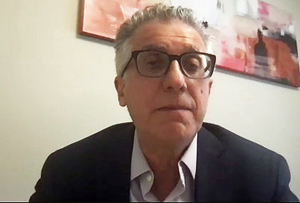
By BERNIE BELLAN While there were a great many interesting speakers at this year’s Limmud, the one speaker to whom I was looking most forward to hearing was Michael Benarroch, the new president of the University of Manitoba.
Since returning to Winnipeg last summer after having served as the provost and vice-president of Ryerson University in Toronto since the fall of 2017, Benarroch was thrust headlong into having to take over his position in the midst of a pandemic.
Naturally, there haven’t been many opportunities to see and hear Benarroch, nor to interview him since he returned to Winnipeg, so his appearing at Limmud allowed Limmud participants the chance to hear directly from a man whose career has seen him move steadily up the academic administration ladder in the past 30 years.
At times wistful – in speaking of his family’s having come here from Morocco, at other times contemplative, in discussing how important it is to include Indigenous students and faculty in reshaping the U of M, Benarroch told a story – of how he’s arrived at his present situation in life and what his goals are looking forward.
“My parents never had the opportunity to go to university,” Benarroch explained at the outset of his presentation.
“My family came to Winnipeg (from Morocco) because my mother’s brother was in Winnipeg. My father was a teacher, but when he came to Winnipeg he found a job as a shochet,” Benarroch said.
It was while he was an undergrad at the University of Winnipeg that Benarroch said he developed a “passion for economics”. He later went on to acquire a PhD in Economics from Carleton University – in 1992.
Upon completing his PhD Benarroch returned to the University of Winnipeg. At the time, he explained during his presentation, Lloyd Axworthy was President of the University of Winnipeg and Axworthy asked Benarroch whether the university should have a business school?
“I designed a vision,” Benarroch said, and eventually he became dean of the new Faculty of Business and Economics.
After 19 years at the U of W, Benarroch said he “interviewed for Dean at the Asper School of Business” at the University of Manitoba, which he became in 2011.
“The University of Manitoba is one of 50 research intensive universities in Canada,” Benarroch noted – something that was to prove a factor in his wanting to return here this past year.
In 2017, Benarroch became Provost and Vice-President Academic at Ryerson University.
For Benarroch, Ryerson was a good fit, he explained, because “it had a real focus on community engagement and entrepreneurship.”
As for moving to Toronto, Benarroch admitted that he and his wife, Kim (Bailey), “missed Winnipeg a lot – especially Kim.” Still, by the time they left Toronto this past summer, both their sons (Keenan and Aden) had also moved to Toronto, so returning to Winnipeg was a bit of a mixed blessing for Michael and Kim.
The story how Benarroch came to be president of the University of Manitoba is an interesting one.
When he applied for the position – in 2019, “I didn’t even tell my family I was applying,” he said. And, when he came to Winnipeg to interview for the position, he didn’t even tell his brothers he was here. (Al Benarroch is Executive Director of Jewish Child and Family Service, while Yosef Benarroch is Rabbi of the Adas Yeshurun Herzlia Congregation, although he also lives part of the year in Israel – during normal times. A fourth brother, Yamin, who is also a rabbi, lives in Vancouver).
Ultimately, Benarroch “was offered the position of president (of the U of M) in 2019,” he said, “then Covid hit and turned everything topsy turvy.”
At that point, the host of this particular Limmud session, Faye Rosenberg Cohen, asked Benarroch: “Did you plan out the career part?”
Benarroch responded: “I knew the presidency at the University of Manitoba was coming up. I kept my eye on it, but I thought that (moving to Toronto) was going to be my last move.
“There had to be a good reason for me to move from one institution to another.
“During my time at the Asper School I thought though that I really meshed well with the atmosphere at the University of Manitoba.”
As for Ryerson, Benarroch noted that the school began as a polytechnic institute and it still carries a very large imprint as a technical training school even though it is now a university.
“Ninety-five percent of the students have an experiential background – serving in apprenticeships” and work programs, while attending classes, Benarroch explained.
Part of Benarroch’s mandate while he was at Ryerson, he noted, was to “rebuild the faculty.”
“We went from 700 to over 900 in the three years I was there,” Benarroch stated.
“We hired quite a few younger academics who brought a lot of energy with them,” he added.
Another major change that Benarroch said he helped to foster was a concerted effort to hire more Indigenous instructors.
“When I arrived there were only six Indigenous professors at Ryerson,” he observed.
“Working with students and elders we launched a reconciliation process. We made Ryerson a place where Indigenous people would feel welcome,” including by “hiring 20 new Indigenous staff,” Benarroch said.
“We also brought in a fair bit of scholarship money for Indigenous students,” he added.
Yet, when the opportunity to take over as president of the University of Manitoba presented itself, Benarroch noted, that despite his having fit in well at Ryerson, he said that “you never want to leave a job, but if I hadn’t taken that opportunity I don’t think it would have come up again.”
Rosenberg Cohen asked Benarroch “How has being a religious Jew worked for you, first as a professor, then as an administrator?”
Benarroch replied: “As a prof, it was great. As an observant Jew I was always able to schedule my time so as to be able to observe Shabbat.”
Benarroch mentioned that one of the two sabbatical years he took as a professor was at the University of Haifa, which was of particular significance for him – being able to spend the year in Israel.
However, upon becoming an administrator, Benarroch suggested, “my schedule was not mine as much as it was in the past…At Ryerson, the president was an observant Muslim, so I always I had to make sure I was on campus on Fridays while he was attending prayers.”
Further, Benarroch noted, while the advent of Zoom during the pandemic has certainly enabled teaching and meetings to carry on, Zoom has, in fact, “made it harder to remain Shabbat observant.”
Prior to the pandemic, he explained, if he had a meeting or conference to attend – even on a Shabbat, “I would be staying in a hotel and I could attend a meeting – without taking any notes.”
Now, it’s impossible to participate in a Zoom session during Shabbat, he said – and since the workday seems to have expanded to include almost any hour of the day, Benarroch admitted that, as much as technology has allowed meetings to be held relatively easily, it has presented problems for him having to decide between his obligations as a university president and his religious observance.
As for some of the other more noticeable effects that the pandemic has had on his role as president at the U of M, Benarroch said: “I have four staff members in my office; I’ve seen one of them in person.”
Benarroch told the Limmud audience that, prior to assuming his new role, he read a book offering advice on “how to be a university president”.
(Rosenberg Cohen asked the question that was probably on everyone else’s minds at that point: Are there enough people in the world who would be in the position that they were interested in becoming a university president that it would be worth it to write a book about that subject?)
In any event, Benarroch said that this particular book did offer two really good pieces of advice:
1. Don’t make a major decision during your first six months in the new position;
and 2. Go out and meet as many people as you can off the bat.
(Obviously, the second piece of advice was thrown out the window when Benarroch returned to Winnipeg during the pandemic.)
In terms of how the pandemic will change the way university courses are taught even following the pandemic, Benarroch suggested that what is likely to occur is that professors will teach classes where some students attend in person while other students will take those same classes online.
“We’re also looking to have classes for Indigenous students up north” offered online, following on the success of Zoom teaching during the pandemic, he suggested.
While “there has been a lot of resistance to teaching online among academics,” Benarroch admitted, “students have been adapting.”
With reference to how many students are actually enrolled at the university this academic year, Benarroch observed that, while there are “fewer first year students at the University of Manitoba, there have been more students return for second, third, and fourth year” than in previous years.
“Enrolment is definitely up,” Benarroch said, “and we expect to see the majority of students return again in the fall.”
Rosenberg Cohen asked: “If I were a parent, thinking of spending money to send my child to a university somewhere, why would I spend all that money when they can take their classes online?”
Benarroch’s response was that, while virtual classes will certainly be a major part of whatever format universities eventually evolve into becoming, there is going to be a greater emphasis on “more participation, more research, more experiential. There are going to be more opportunities outside the classroom”, but they are going to be in person, not online.
As an example, Benarroch said he’s planning on creating a “student start-up zone”, in which students will start their own businesses.”
“It’s better to fail at a business when you’re 23 than when you’re 55,” Benarroch observed.
Rosenberg Cohen asked: “What are your hopes and dreams?”
Benarroch said, “Here at the University of Manitoba we have a tremendous testing capacity. Winnipeg could become a testing centre for vaccines,” for instance he suggested.
Continuing on the thread of what his hopes and dreams are, Benarroch said: “I’d like to see the University of Manitoba become a global leader in certain areas.
“I’d like to see the university become a racist-free zone.” (He noted that the previous president of the U of M, David Barnard, “had launched a task force on Equality, Diversity, and Integration.)
“We know we can’t stamp out racism, on campus,” Benarroch observed. “The question is how to deal with it.”
Someone in the Zoom audience wondered how one can maintain a balance between stamping out racism while still allowing free speech?
“We’re still a university. We are going to have debate and disagreement,” Benarroch said in response.
Someone else wondered “How does the university compensate for lab work that can’t get done?
Benarroch answered that “We allow 20 percent capacity in some spaces…We’ve also developed a way to hold some of the labs virtually.”
As well, Benarroch said that, for ten days in January, students in the Faculties of Nursing, Science, Architecture, Engineering, and Agriculture, were allowed back on to campus” to conduct lab work – under strict Covid protocols.
I asked a question along these lines (although the names of questioners were not given): Professors are having to spend more time than ever before finding funding for their programs. With the emphasis on practical, results-oriented programs, where will that leave programs that don’t necessarily have practical applications? (My question was not worded precisely that way, but it was along those general lines.)
Benarroch’s response was that “the university brings in just under $200 million a year in research money – the vast majority of which comes from the federal government.”
He added that he has two goals as far as where the money for research goes: to allow students who were doing research prior to Covid to continue doing that work; and to obtain additional money to keep university labs running.
Benarroch also noted that there is now a “massive reinvestment in science in the US. We have to remain competitive in how we pay faculty and how we keep up our labs.”
It seems quite evident, therefore, that Michael Benarroch is going to be preoccupied with finding ever new sources of funding for the university, while trying to retain whatever sources have been in place until now.
It seemed fitting, therefore, that one of his final observations was that “one of my mandates as president is to speak to government”.
Still, lost in all the discussion about funding and research was any reference to the less practical aspects of a university education. Of course, that’s a subject that’s been debated for a very long time. I just wonder where faculties such as Arts are going to end up with the even greater emphasis on “research” oriented programs.
Local News
New Israeli restaurant opens in River Heights

By BERNIE BELLAN (July 6, 2025) It’s been a long time since our community has been able to welcome the opening of a restaurant that specializes in Israeli food.
That void is now going to be filled with the opening of The Green Falafel, at 1833 Grant (corner of Centennial – next to the Subway).
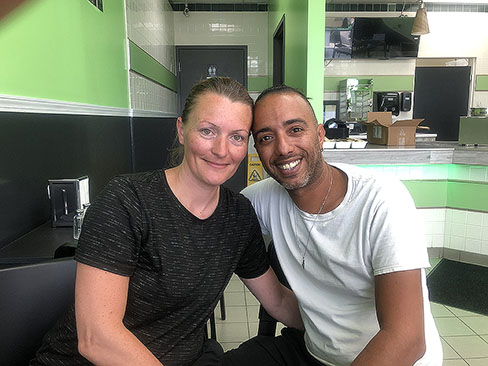
The restaurant is the fulfillment of a dream long held by the husband and wife team of Ariel and Eden Maudi, who have been living in Winnipeg the past 11 years.
Ariel, who was born in Israel and grew up in Beer Sheva, says that he worked in telecommunications in Ramat Gan for several years. He adds though that he had always dreamed of owning his own falafel stand in Israel, but life was difficult there and he decided to come to Canada as a tourist to see whether there were any opportunities here for him, Eden and their two young children.
Eden, who was born in Russia and moved to Israel with her family in 1996, stayed behind with the two kids, who were both pre-schoolers, while Ariel tested the waters in Canada first.
Ariel says he came to Canada as a tourist in 2013. His first stop was in Toronto, where he acquired his 1st class driver’s license. At the end of 2013 he moved to Winnipeg where he began working as a truck driver. Soon he found himself employed as a successful sales person at Vickar Nissan where, he says, he once achieved the status as the top car sales person in Canada. After working at Vickar Nissan for a number of years, Ariel began working as an installer for Bell MTS.
Meanwhile, Eden began working at a Walmart, later at the Costco on Regent.
But, when the opportunity to move into a space that had been previously occupied by another restaurant, but which had closed, became available, Ariel and Eden decided to open their own Israeli restaurant in an area that hadn’t seen Israeli food served since the controversial closure of Bermax Café in 2019.
The Maudis say that they will be serving a variety of Israeli dishes – all vegetarian, and that they will be fully kosher.
The “green” in Green Falafel, by the way, Ariel Maudi explains, comes from the cilantro and parsley that are added to the chickpeas. In addition, their pitas will be coming from Israel and will be baked fresh daily.
The Green Falafel will be open from 10-8 daily. Delivery will be available through Uber Eats and DoorDash.
Call 204-557-7837 for information.
Local News
Previews of shows with Jewish performers at this year’s Fringe Festival July 16-27

For show dates and venues go to winnipegfringe.com
By BERNIE BELLAN As has been our custom for many years now we try to find shows that have either Jewish performers or themes that would have particular appeal for Jewish audiences. Many of the Jewish performers at this year’s festival have been here before, but several are new. In no particular order here are blurbs about the shows we’ve found that fit the criteria I’ve just described. (By they way, if we’ve omitted a show that should be included in our list there’s plenty of time to get added to this post. Just drop me a line at jewishp@mymts.net.)

You’ve Been Served: A One-Woman Show About Divorce, Cults, and Coming of Age at Midlife
Noemi Zeigler
You are hereby summoned… to laugh, cry, and maybe belt out a Streisand number in solidarity. You’ve Been Served is a raw and riotous solo comedy by writer-performer Noemi Zeigler. It all begins when Noemi is served divorce papers on top of a garbage bin lid while taking out the trash—an undignified start to a full-blown midlife unraveling.
At 50, still clinging to her dream of becoming a singer, she falls under the spell of a music producer slash self-help guru, joins a spiritual cult, and, instead of landing a record deal, she lands in jail. Behind bars, with help from her long-buried inner child, she begins to reclaim her voice and her power. Turns out, dreams really do come true—just not the way she expected.
The show features vividly drawn characters—including a manipulative cult leader, a toxic ex-husband, and a jail guard named Roach who shares Noemi’s obsession with the fashion of Charlie’s Angels (the ‘70s TV version, of course.)
With salsa dancing, twerking, and a belting rendition of Don’t Rain on My Parade, Zeigler dives into abandonment, reinvention, and self-rescue. As she confronts perimenopause, she discovers it’s not the end—it’s the new puberty. The show touches on grief, sexuality, and spiritual confusion, but Noemi’s childlike optimism asks: What if your breakdown is actually your breakthrough?
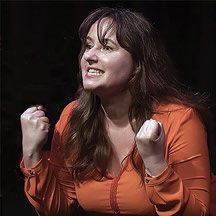
You’re good for nothing… I’ll milk the cow myself
Written & Performed by Natacha Ruck
France, 1981: The first socialist president is about to be elected and young Natacha is ready to implement her own political platform. But first, she has to take down the schoolyard bully,emasculate the rules of French grammar and make off with grandmother’s chocolate.
If you think you know the limits of Jewish mothers, evil grandmothers and transcontinental lovers, meet Natacha Ruck’s family. This true tale of three generations of women, facing three world wars, is equal parts hilarious, shocking and zany.

A One Human Being, Potentially Comedic Performance of Beauty and the Beast NEW WORK!
Written & Performed by Alli Perlov
Be our guest! Local high school drama teacher Alli Perlov is back for a tale as old as time. Can she sing? Not really. Can she act? That’s debatable. Will you laugh? Oh… probably.
Perlov plays dozens of characters, some human, some animal, and many objects, in a comedic exploration of Beauty and the Beast.
In an homage to this brilliant musical adventure, through witty commentary and unstoppable energy, Perlov aims to entertain an audience that isn’t forced to be there like her students.

Hockey Sticks and Beaver Pie
Written & Performed by Melanie Gall
Take a trip around Manitoba. From the 30,000 ft. St. Adolphe snow maze to the Narcisse snake dens! After all, where else holds both the title of Slurpee Capital of the World and the Guinness Record for the most people simultaneously howling like wolves?
Deanna Durbin, Terry Jacks and Burton Cummings are among the many homegrown stars, and Hockey Sticks features their music along with original songs and the stories that make this province unique.
Starring Melanie Gall from past shows Piaf & Brel, Ingenue and Toast to Prohibition
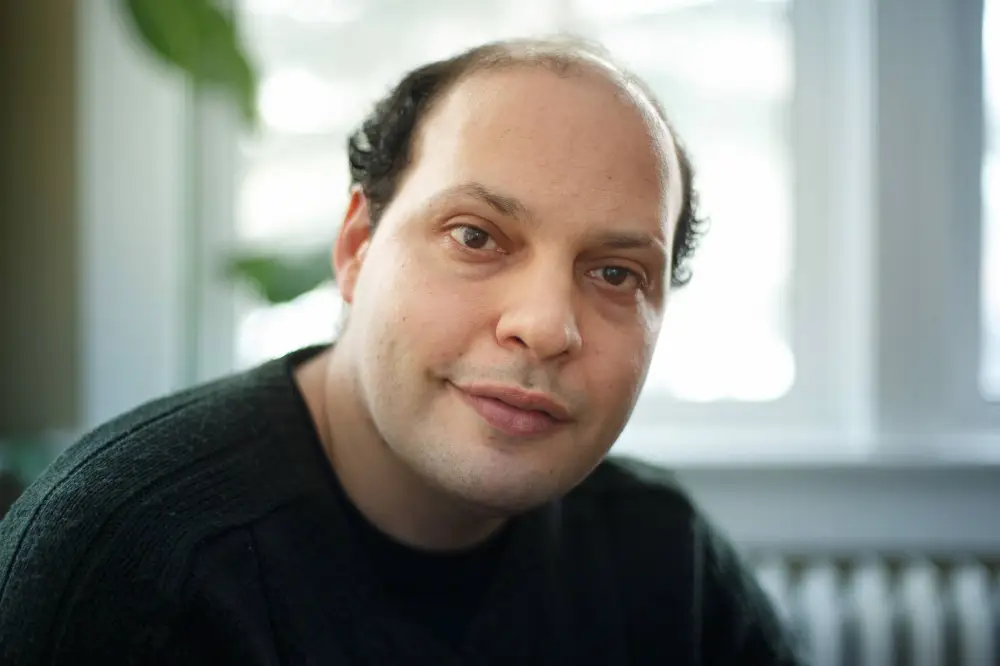
Nerohilarity Exposed
Produced by Adam Schwartz
We all sometimes feel exposed, whether that’s as a fraud or a pretender.
The performers of the award-winning Neurohilarity show, Danielle Kayahara (Laugh Out Loud CBC), Carole Cunningham (Yuk Yuks, The Debaters), Adam Schwartz (Winnipeg Fringe) and Rollin Penner (Yuk Yuks, CBC, Rumors, Winnipeg Comedy Festival), apply a comedic spin to the experiences that make us feel insecure, stripping away the emotional weight with nittygritty jokes and stories that will have you laughing uproariously.
Brilliantly awkward.
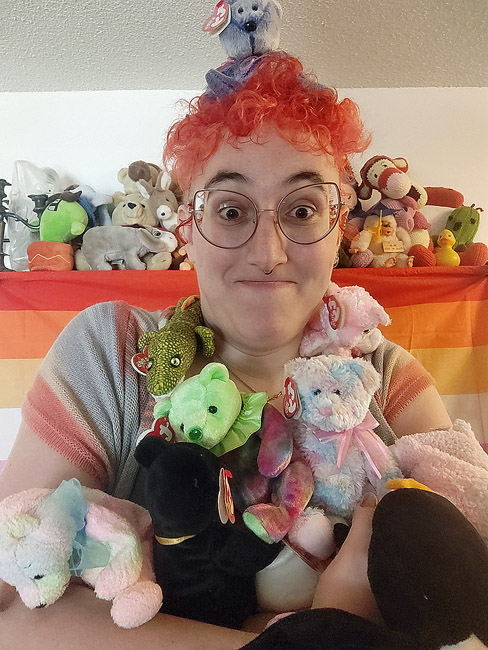
A Lesbian in the Kitchen
Willow Rosenberg
Professional lesbian Willow Rosenberg takes you on a journey through the centuries, superstitions and tablespoons of her lifelong passion for baking in this spiritual successor to 2024’s Jenny Award-nominated A Lesbian in a Bear Store.
Whether you have a favourite spatula, bake once or twice a year, or live in constant fear of being told to “just fold it in”, this one-woman show about family, joy, tradition (but make it gay),
Judaism, comfort, home (but make it gayer*), love, chemistry and magic is for you!
*Who’re we kidding, it’s all gay!

Eleanor’s Story: An American Girl in Hitler’s Germany
Written & Performed by Ingrid Garner
(Ed. note: Although Ingrid Garner isn’t Jewish, we thought the theme of this show might have a special appeal for Jewish readers.)
Based on Eleanor Ramrath Garner’s best-selling memoir, this 16x internationally award-winning adaptation – performed by her granddaughter, Ingrid Garner – details Eleanor’s youth as an American caught in Second World War Berlin.
Punctuated with humour and accompanied by cinematic sound and video, Garner embodies her ancestors in this coming-of-age odyssey, delivering an account of war that is more relevant than ever.
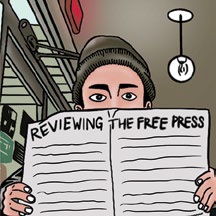
Reviewing The Free Press 2
Benji Rothman
The Winnipeg Free Press has run amok, reviewing each and every Fringe show over the past two decades without consequence or recourse. Now, it’s their turn… again.
In this refurbished work that debuted at last year’s Winnipeg Fringe, Benji Rothman once again takes the Winnipeg Free Press to task. In this (mostly) new, (hopefully) hilarious 45-minute show, Rothman dives deep into their past and exposes their faulty journalism, imbalanced reporting and, of course, embarrassing typos.
Local News
Jewish performers at this year’s Winnipeg Folk Festival July 10-13

The Black Sea Station
Long ago, there were the klezmorim, itinerant musicians who roamed the back streets of Eastern Europe, playing at parties for meals and a few coins. The sound they honed then was a visceral exploration of life’s joy, and its loss; they could whip audiences into a frenzy of dancing, or bring them to tears with the mournful wail of a clarinet. Today, Winnipeg’s own The Black Sea Station is carrying on this tradition. Featuring Daniel Koulack (bass), Victor Schultz (violin) and Myron Schultz (clarinet) — cofounders of seminal local klezmer act Finjan — along with Moldovan accordion wizard Nikolai Prisacar and multi-instrumentalist Ben Mink, the quintet transports listeners to a time and place long past. Through a mix of original songs rooted in history, and traditional tunes spun up with modern zest, they whirl through the exuberant klezmer sounds of their Eastern European heritage, tending the old ways with deep love and respect.
The Black Sea Station will be performing Sunday, July 13, at 1:00 pm in Snowberry Field.
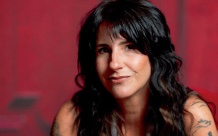
Romi Mayes
Romi Mayes has taken some hard knocks in her life, but she’s never faded away. For more than 25 years, Manitoba’s first lady of blues-rock has been a lynchpin of the Canadian roots scene. She earned that position the old-fashioned way, through her gritty, passionately emotive music. With her sizzling guitars and full-throated rasp, the Juno-nominated performer howls and purrs through razor-edged lyrics, rocking out wherever she can find a stage. She’s long been one of the hardest-working musicians on the circuit, keeping a busy slate of gigs and mentoring up-and-coming artists to get a foothold on the trails she blazed. Now, after a nine-year hiatus from the studio, Mayes has put her scintillating sound back on record with her long-awaited seventh album, Small Victories — a return that leaves no doubt, no matter the ups and downs, Mayes is here to stay.
Romi will be performing Friday, July 11, at 1:00 pm in Burr Oak.
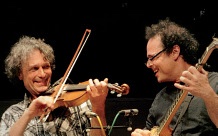
Leonard Podolak (with Matt Gordon)
Ireland’s Matt Gordon is a fiddler and singer, whose fleet-footed clogging and thigh-slapping hambone has taken stages by storm since the 1980s. Leonard Podolak is a virtuosic master of the clawhammer banjo, who for decades has whipped up some of Manitoba’s wildest roots parties with his band, The Duhks. Put those talents together, and they can promise you this much: we’re all gonna have a real good time. Longtime friends and musical collaborators, Gordon and Podolak deliver an exhilarating trip through old-time Appalachian music. Their performances seamlessly blend intricate instrumental lines with heartfelt singing and dazzling dance. They’ve teamed up on a few records over the years, including 2020’s bigband extravaganza Power Wagon: Live At Shanley’s. But the best way to experience this duo’s toe-tapping, hand-clapping chemistry is to see it live.
Podolak and Gordon will be performing A concert with a side of clogging Sunday, July 13, at 3:00 pm in Folk School.
